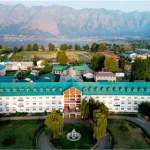With India marching towards Amrit Kaal, the centenary of the country’s Independence offers a significant milestone to the national efforts on sustainable development. Prime Minister Narendra Modi has called for ‘sabkaprayas’ in meeting this milestone with provisions of basic amenities for all. As the Modi government is trying to expand the economy to a scale which befits India’s size, among the many challenges that stand in the way is climate change.
Climate science has established that global surface temperature increase is directly proportional to cumulative emissions and limiting it requires global GHG emissions to be kept within a specific limit, called the global carbon budget. It is no secret that a disproportionately large part of the global carbon budget has been used by the developed countries. The world, from 2020, has a remaining carbon budget of 500 gigatonnes of carbon dioxide equivalent, for a 50% probability of limiting global warming to 1.5°C to pre-industrial levels and a remaining carbon budget of 1350 gigatonnes of carbon dioxide equivalent to have a 50% probability of limiting global warming to an increase of 2 °C.
The key principle that informs India’s climate policy is pursuingthe country’sdevelopment goals along low carbon development pathways. PM Modi has time and again said India’s growth paradigm sees development and climate action as complementary to each other, rather than being contradictory to each other.
India is striving towards low carbon development in accordance with national circumstances. As a developing country with a long coastline, vulnerability to monsoon disruption, high dependence on agriculture for livelihood, and possible impacts on water systems, among other kinds of exposure to climate extremes and consequent hazards, India is likely to bear a considerable added development burden from the impact of climate change. Nevertheless, in keeping with its responsibilities as a large nation and in keeping with its traditions and culture, India is committed to a leading role in meeting the challenge of global warming.
India’s Long-Term Low Greenhouse Gas Emissions Development Strategy (LT-LEDS) rests on seven key transitions to low-carbon development pathways. India has already initiated these transitions to low-carbon development pathways through policies, programmes, and initiatives.
Low-carbon development of electricity systems consistent with development
Growth in the power sector is critical for enabling industrial expansion, augmenting employment generation, and building an Aatmanirbhar Bharat. At the moment India is expanding renewables and strengthening the grid, it is exploring and/or supporting other low carbon technologies, focusing on demand-side management, moving to rational utilization of fossil fuel resources, with due regard to energy security, assessing enablers for low carbon development, determining green taxonomy and optimum energy mix (complementing national development scenarios).
Integrated, efficient, inclusive low-carbon transport system
Transport is a major contributor to GDP both directly and indirectly. India is working on low-carbon options in the context of significant expansion needed across transportation modes for passenger and goods mobility. The country is encouraging improved fuel efficiency, promoting a phased transition to cleaner fuels, modal shift towards public and less polluting modes of transport, electrification across multiple modes, strengthening demand side management, traffic management and intelligent transport systems.
Adaptation in urban design, energy and material-efficiency in buildings, and sustainable urbanisation
When it comes to developing urban areas, exploring and encouraging adaptation measures in urban designsis critical. This will be a major focus alongside measures to promote sustainable urban design in the context of expanding cities. India is mainstreaming adaptation measures in the built environment and urban systems, it is promoting resource efficiency within urban planning guidelines, policies, and bylaws, promoting climate responsive and resilient building design, construction, and operation in existing and future buildings and in urban systems and promoting low-carbon municipal service delivery through resource efficiency, management of water, solid, and liquid waste.
Economy-wide decoupling of growth from emissions
Industrial growth is a major objective in the near, medium, and long-term with policies directed at increasing the share of manufacturing in the GDP. The Narendra Modi government is making due efforts to recognise the informal sector and the development of the Micro Small and Medium Enterprises (MSME) sector. Low-carbon options are being explored in this context, recognising that there are many hard-to-abate sectors.
India’s focus is on improving energy and resource efficiency, with efforts to increase the use of natural and bio-based materials, processing and fuel switching and electrification in manufacturing, as feasible and viable, enhancing material efficiency and recycling strengthening the circular economy, promoting green hydrogen technology and infrastructure, exploring options for sustainable growth of hard-to-abate sectors, low-carbon and sustainable growth of MSMEs.
CO2 removal and other engineering solutions
The area of CO2 removal is a new sector being explored the world over and is being considered even in the Indian context. The move, however, requires substantial international support through innovation, technology transfer, climate – specific finance and capacity building. For now, India is training, capacity building and planning to minimise socio-economic, livelihood and ecosystem impacts of the move. We are also exploring public-private partnership frameworks in view of intensive resource requirements.
Enhancing forest and vegetation cover consistent with socio-economic and ecological considerations
India’s national commitment to the enhancement of natural resources, preservation of resource heritage and promoting biodiversity is driving the strategy in this sector. It will also be an inclusive approach taking note of livelihood, social and cultural dependence of the relevant population. The approach involves restoration, conservation, and management of forest and its plant, animal and microbial genetic resources, restoration, conservation, and management of trees outside forests, strengthening infrastructure of state forest departments, including upgradation of nurseries.
Economic and financial aspects of low-carbon development
Given the priorities of poverty eradication, increasing employment and incomes, increasing resilience to climate change, and reaching a new level of prosperity, low-cost international climate finance is essential to achieve the objectives of low-carbon development. India is assessing financial requirements, mobilising, accessing and delivering climate specific finance, especially multilateral climate finance, mainstreaming of climate finance, linkages to international trade as well as new multilateral mechanisms to support innovation, and technology development.
PM Modi has through all his actions and visionary policies ensured India as a nation has taken on more than its due share of responsibility towards saving the planet and has committed to climate action. India has been pro-active in its commitment to international cooperation and in fulfilling the requirements of the global climate regime that we have collectively agreed to under the United Nations Framework Convention on Climate Change, its Kyoto Protocol and Paris Agreement. India’s LT-LEDS make clear that India under PM Modi is stands by its commitment to equity and climate justice.
(The Author is Union Cabinet Minister for Environment, Forest & Climate Change)





